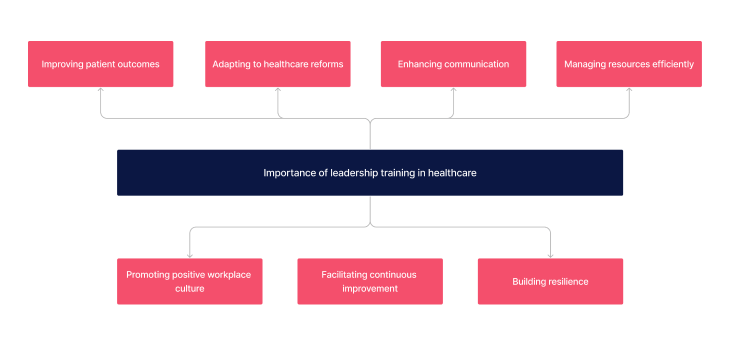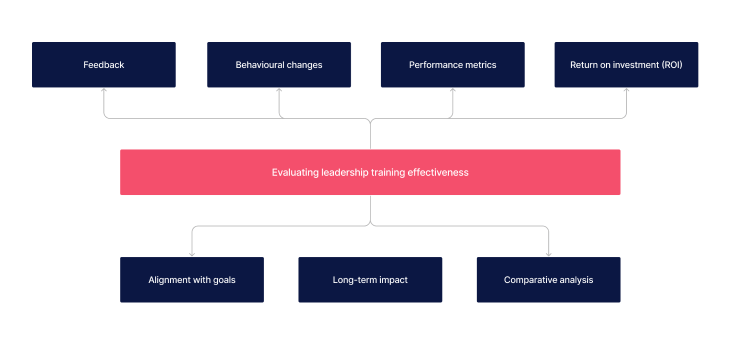What is Leadership Training?
Leadership training encompasses a diverse range of activities specifically designed to enhance the skills and abilities of leaders at various levels. These activities, ranging from workshops and seminars to interactive training sessions, are geared towards developing robust management skills, effective decision-making capabilities, and fostering team coordination and resilience. Such training is crucial in equipping individuals to navigate complex environments, manage change effectively, and lead with vision and empathy.
What is leadership training in healthcare?
In the dynamic and challenging arena of healthcare, leadership training takes on a specialised approach. It addresses the unique challenges and responsibilities prevalent in health systems. This involves managing sensitive health information, ensuring confidentiality and accuracy in patient health records, and delivering comprehensive primary care. Tailored training courses often focus on specific health conditions, public health concerns, and the intricacies of navigating the healthcare system. These courses are designed to empower health professionals, including general practitioners and allied health staff, to lead effectively amidst the complexities of healthcare delivery.
What is the Role of Leadership Training in Healthcare?
Leadership training in healthcare serves a multi-faceted role. It prepares individuals not only to handle the administrative and managerial aspects of health services but also to lead team members with competence and compassion. Such training is instrumental in overseeing allied health activities, fostering a culture of continuous improvement, and ensuring the effective delivery of patient-centric healthcare. Moreover, it plays a critical role in developing leaders who can adapt to and effectively manage evolving health conditions, regulatory requirements, and healthcare policies.
Why is Leadership Training Important?

The significance of leadership training in healthcare extends far beyond basic management skills. It is integral to the successful operation of healthcare facilities and directly impacts patient care. The following points elaborate on the importance of leadership training in healthcare:
- Improving Patient Care: Effective leadership directly correlates with the quality of patient care. Leaders trained in best practices are better equipped to implement patient-centered policies, ensuring that healthcare delivery is both efficient and compassionate.
- Adapting to Healthcare Reforms: The healthcare industry is constantly evolving with new reforms and technologies. Leadership training prepares managers to adapt to these changes, ensuring that healthcare facilities remain compliant and up-to-date with current standards.
- Enhancing Communication: Leadership training often includes a focus on communication skills, which are crucial in a healthcare setting. Clear and effective communication among staff leads to improved teamwork and better coordination of patient care.
- Managing Resources Efficiently: Skilled leaders are adept at resource management, which is critical in healthcare where resources can be scarce. Effective leadership ensures optimal use of resources, reducing waste and improving overall service delivery.
- Promoting a Positive Workplace Culture: Leaders set the tone for the workplace environment. Training helps leaders to foster a positive culture within healthcare organisations, which can lead to higher job satisfaction, lower staff turnover, and a more motivated workforce.
- Facilitating Continuous Improvement: Trained leaders are more likely to engage in continuous learning and improvement initiatives. This attitude towards growth can drive innovation in healthcare practices and contribute to the long-term success of healthcare institutions.
- Building Resilience in Healthcare Teams: Leadership training includes strategies for building resilience and managing stress, which is particularly important in the high-pressure environment of healthcare. Resilient leaders can better support their teams and maintain high standards of care even in challenging situations.
Examples of Leadership Training in Healthcare
Leadership training in healthcare takes various forms, each tailored to address specific aspects of health management and patient care. The following examples illustrate practical applications of leadership training, highlighting its versatility and relevance in different healthcare settings.
- Comprehensive short courses on healthcare management, focusing on the nuances of managing health systems and health insurance policies.
- Interactive workshops aimed at enhancing effective communication within health services, crucial for team collaboration and patient engagement.
- Targeted seminars addressing leadership challenges in primary care settings, with a focus on patient care, team management, and health service efficiency.
Strategies for Creating Effective Leadership Training Programs
The development of a successful leadership training program requires strategic planning and a deep understanding of the healthcare environment. Here are some key strategies that can be employed to create a training program that is both effective and impactful.
- Needs assessment: Conduct a thorough needs assessment to understand the specific requirements and challenges faced by health professionals in their respective roles.
- Practical scernarios and case studies: Integrate practical scenarios and case studies related to health insurance, public health policies, and health information management, to provide hands-on experience.
- Skills emphasis: Emphasise the development of skills crucial for managing health records, health information, and navigating the complexities of the healthcare system.
How to Evaluate the Effectiveness of Leadership Training Programs

Evaluating the effectiveness of leadership training programs in healthcare is critical to ensure they deliver real value and improvement. The following points detail the key aspects to consider in the evaluation process:
- Participant Feedback: Gathering feedback from participants is essential. Surveys, interviews, and focus groups can be used to assess their satisfaction with the training, perceived relevance to their roles, and any improvements they suggest.
- Behavioural Changes: Observe whether participants have applied what they learned in their work environment. Look for tangible changes in their leadership style, communication, decision-making, and ability to motivate and manage their teams.
- Performance Metrics: Use quantifiable data to assess the impact of the training. This might include reduced staff turnover rates, improved patient satisfaction scores, or enhanced operational efficiency within the department or team.
- Return on Investment (ROI): Calculate the ROI by comparing the cost of the training program against the benefits it brought to the organisation. This includes both tangible gains, like improved productivity, and intangible ones, like better team morale.
- Alignment with Organisational Goals: Evaluate how well the training aligns with the broader goals of the healthcare organisation. Determine if the training has contributed to achieving strategic objectives, such as improved patient care or operational excellence.
- Long-term Impact: Assess the long-term effects of the training. This includes sustained improvements in leadership practices, ongoing professional development of participants, and the overall impact on the organisation’s culture.
- Comparative Analysis: Compare the outcomes of the training program with those of previous years or with other departments that did not undergo similar training. This helps in understanding the effectiveness of the program in relation to other variables.
Want a healthcare LMS that can reinforce leadership training?
Contact Ausmed today and see how we can support your organisation!
Benefits and Negatives of Leadership Training
| Pros | Cons |
|---|---|
| Enhanced decision-making capabilities in complex healthcare environments, leading to improved patient outcomes and more efficient use of resources. | Time constraints for busy health professionals, which can make it challenging to balance training with clinical responsibilities and personal commitments. |
| Improved team coordination and collaboration, resulting in better patient care, reduced errors, and a more supportive work environment. | Financial investment required for comprehensive training programs, which may not always be feasible for smaller healthcare facilities or individual practitioners. |
| Increased adaptability and resilience among healthcare leaders, enabling them to effectively navigate the rapidly changing healthcare landscape. | Potential resistance to change from staff, which can be a significant barrier to implementing new leadership strategies and practices. |
| Development of a strong leadership pipeline, ensuring continuity and stability in healthcare management and governance. | Risk of outdated or irrelevant content in training programs, which may not align with current healthcare challenges and technological advancements. |
| Fostering a culture of continuous learning and improvement, which is essential for keeping pace with advancements in healthcare and patient care techniques. | Difficulty in measuring the direct impact of leadership training on patient care and healthcare outcomes, making it challenging to justify the investment. |
Related Resources
- What Are Learning Analytics?
- What Are the Key Learning Analytics Metrics?
- A Step-by-Step Guide to Data Collection for Learning Analytics
- How to Create a Culture of Continuous Learning
- How to Manage an Effective Staff Training Program
- Identifying Skills Gaps with Learning Analytics
- How Can I Implement Self-Directed Learning Strategies?
- How Do I Evaluate the ROI of a Learning Program?
Conclusion
Leadership training in healthcare is an indispensable tool for the development of competent, visionary leaders capable of navigating the complexities of the healthcare system. It transcends the enhancement of individual skills, contributing significantly to the overall improvement and efficacy of health services. This, in turn, translates to better healthcare outcomes for both service providers and patients, underscoring the profound value of leadership training in the realm of healthcare.
References
- Health.vic.gov.au. (n.d.). Leadership in allied health. [online] Available at: https://www.health.vic.gov.au
- HETI.nsw.gov.au. (n.d.). NSW Health Leadership and Management Framework. [online] Available at: https://www.heti.nsw.gov.au



